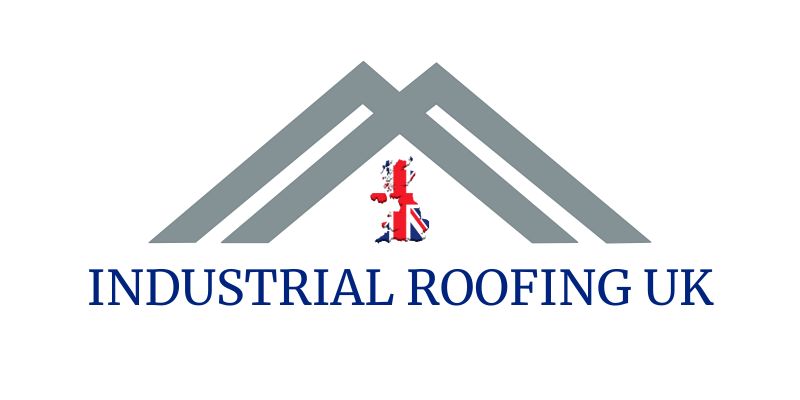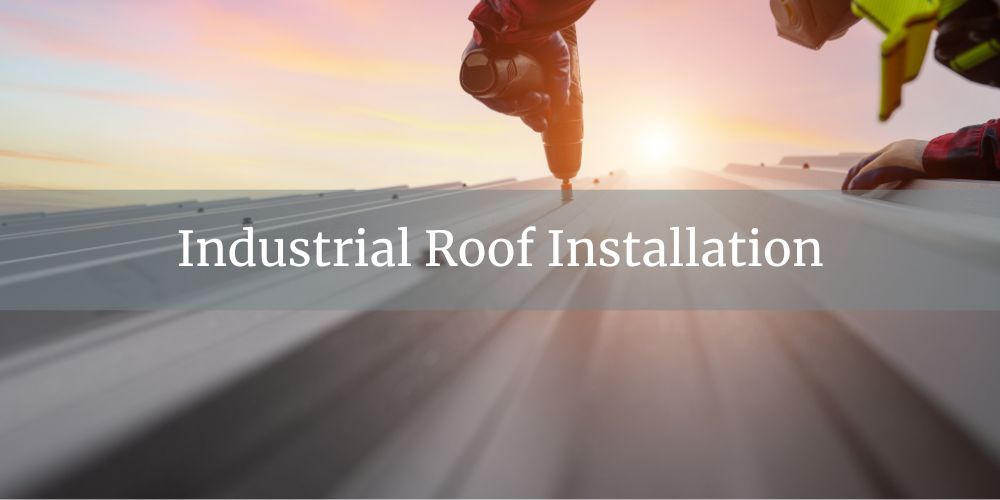Industrial roof installation refers to the process of fitting a new roofing system on industrial buildings. This involves preparing the structure, selecting suitable materials, and ensuring accurate installation to meet specific performance requirements. The goal is to provide robust, weather-resistant, and energy-efficient protection for the facility. Professional installation ensures the roof’s longevity and optimal functionality, safeguarding the building and its operations.
Industrial Roofing UK provide professional industrial roof installation services across the UK, delivering robust, long-lasting solutions for factories, warehouses, and large-scale industrial buildings. Our experienced team installs a wide range of systems including; metal roofing, single-ply membranes, built-up felt, and composite panel systems. All of Industrial Roofing UK's installation solutions are tailored to the structural and environmental needs of each facility. We manage projects from design through to completion, ensuring compliance with building regulations, thermal performance targets, and operational requirements. With nationwide service and minimal disruption to your workflow, we deliver roof installations built for durability, safety, and long-term value.
What Is Industrial Roof Installation?
Industrial roof installation involves the process of designing, planning, and constructing roofing systems for industrial buildings such as factories, warehouses, and manufacturing plants. This procedure requires selecting appropriate materials like metal panels, chosen for their strength and resistance to environmental stressors. Proper installation of industrial roofing is essential for ensuring roof longevity and performance under harsh conditions.
The installation process begins with a comprehensive assessment of the building’s requirements, followed by precise measurements and planning to ensure an accurate fit. Skilled professionals then install the roofing materials, ensuring all components are securely attached and sealed to prevent leaks and other issues. The Building Research Establishment (BRE) emphasises the importance of using high-quality materials and following best practices to achieve a robust and reliable roof.
In addition to the primary roofing materials, industrial roof installations often include insulation and ventilation systems to enhance energy efficiency and indoor climate control. Regular maintenance and inspections are crucial after installation to address any issues promptly and extend the roof's lifespan. Investing in professional installation services ensures industrial roofs provide optimal protection and efficiency, supporting the overall functionality and safety of the building.
Have a question about an upcoming project?
How Are Industrial Roofing Installation Methods Different To Those For Commercial Roofing?
Industrial roofing installation methods differ from those used in commercial roofing primarily due to the scale, materials, and functional requirements of the buildings involved. Industrial roofs are typically designed for larger structures such as factories, warehouses, and manufacturing plants, whereas commercial roofs are used for smaller buildings like offices, retail stores, and restaurants. These differences necessitate distinct approaches to installation.
- Scale and Complexity
- Materials Used
- Functional Requirements
- Installation Techniques
1. Scale and Complexity
Industrial roofing installations often involve larger surface areas and more intricate designs to accommodate heavy machinery, ventilation systems, and other industrial equipment. This complexity requires more robust structural support and advanced installation techniques. In contrast, commercial roofing installations are usually simpler and cover smaller areas, making them less complex to install. According to the NFRC, an industrial roof can cover an area exceeding 10,000 square meters, while a commercial roof typically cover less than 2,000 square meters.
2. Materials Used
The materials used in industrial roofing installations are selected for their durability and ability to withstand harsh environmental conditions. Metal roofs, for example, are used in approximately 50% of industrial applications due to their longevity and low maintenance requirements. For this reason the most common roofing material for industrial buildings is metal, with a lesser percentage being TPO, EPDM or built-up roofing systems. Commercial roofing materials, while also durable, often include options like cold applied liquid, single-ply membranes and bitumen, which are suitable for the less rigorous demands faced by a commercial building
3. Functional Requirements
Industrial roofs must meet stringent requirements for durability, fire resistance, and chemical resistance due to the nature of the operations conducted within the buildings. They often include features such as reinforced waterproofing and enhanced insulation to protect valuable machinery and products. Commercial roofs, while still needing to be durable and weather-resistant, focus more on energy efficiency, insulation, and aesthetic appeal. According to a report by the Building Research Establishment (BRE), industrial roofs require insulation values up to 0.18 W/m²K, whereas commercial buildings often aim for around 0.25 W/m²K.
4. Installation Techniques
Installation techniques for industrial roofs involve meticulous planning and specialised skills to handle the larger and more complex structures. This includes ensuring proper load distribution, integrating advanced ventilation systems, and using heavy-duty equipment. Commercial roofing installations, on the other hand, are generally quicker and less labour-intensive, often utilising simpler methods and lighter materials. The NFRC states that industrial roofing projects can take several months to complete, while commercial roofing projects might be finished within weeks.
Understanding these differences is crucial for selecting the appropriate roofing system and ensuring a successful installation tailored to the specific needs of industrial or commercial buildings. According to the National Federation of Roofing Contractors (NFRC), the right installation method can significantly extend the lifespan of a roof and enhance its performance.
What Factors Determine The Quality Of An Industrial Roof Installation?
The quality of an industrial roof installation is determined by factors such as material selection, the expertise of the installation team, and adherence to proper installation techniques. These elements ensure the roof’s durability, performance, and longevity, which are critical for protecting industrial buildings. Understanding these factors helps achieve a high-quality, reliable roofing system.
- Selection of Materials
- Expertise of the Installation Team
- Installation Techniques
- Quality of Components
- Adherence to Safety and Compliance Standards
- Regular Inspections and Maintenance
1. Selection of Materials
Choosing the right materials is essential for a high-quality industrial roof installation. Materials must be durable, weather-resistant, and suitable for the specific environmental conditions the roof will face. Commonly used materials include metal, TPO, and EPDM, each offering unique benefits such as longevity, energy efficiency, and ease of upkeep. Approximately 50% of all industrial roofs in the UK are metal systems, highlighting their popularity for their durability and low maintenance needs. According to the NFRC, using high-quality materials can extend the roof's lifespan by up to 20 years.
2. Expertise of the Installation Team
The skill and experience of the roofing contractors play a significant role in the quality of the installation. A team with extensive experience in industrial roofing will be familiar with best practices and able to handle the complexities of large-scale projects. Proper training and certification, such as those provided by the National Federation of Roofing Contractors (NFRC), ensure the team adheres to industry standards. Studies show professionally installed roofs can reduce the likelihood of future repairs by up to 30%.
3. Installation Techniques
Using the correct installation techniques is crucial for ensuring the roof's performance and lifespan. This includes proper preparation of the roof deck, precise application of roofing materials, and ensuring adequate ventilation and drainage systems. Advanced methods, such as heat-welded seams for TPO roofs, can significantly enhance durability and weather resistance. According to a report by the Building Research Establishment (BRE), proper installation techniques can improve a roof's durability by up to 25%.
4. Quality of Components
The quality of all components used in the roofing system, including fasteners, sealants, and insulation, affects the overall performance of the roof. High-quality components compatible with the chosen roofing materials help prevent issues such as leaks, thermal bridging, and structural failures. The NFRC recommends using components meeting or exceeding industry standards to ensure the long-term integrity of the roof.
5. Adherence to Safety and Compliance Standards
Following safety and compliance standards is essential for a successful industrial roof installation. This includes using appropriate safety gear, following proper fall protection protocols, and complying with local building codes and regulations. Ensuring these standards are met not only protects workers but also helps prevent legal issues and ensures the roof meets all necessary requirements. The Health and Safety Executive (HSE) reports adherence to safety protocols can reduce workplace accidents by up to 50%.
6. Regular Inspections and Maintenance
Ongoing inspections and maintenance are vital for preserving the quality of an industrial roof installation. Regular checks help identify and address minor issues before they become major problems, extending the roof's lifespan and maintaining its performance. According to the NFRC, scheduled maintenance can significantly reduce the risk of premature roof failure by up to 40%.
How Much Does Industrial Roof Installation Cost?
The cost of industrial roof installation typically ranges between £54.00 and £85.00 per square metre (SQM). However, prices can vary depending on specific factors such as the materials used, the complexity of the roof design, and the location of the building.
| Service | Cost Range |
|---|---|
| Industrial Roof Installation | £54 to £85 per sqm |
*These estimates are general and actual costs can vary based on specific project requirements, location, and market conditions.


